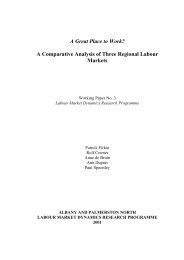The Law and Alternative Working Arrangements. - Labour Market ...
The Law and Alternative Working Arrangements. - Labour Market ...
The Law and Alternative Working Arrangements. - Labour Market ...
Create successful ePaper yourself
Turn your PDF publications into a flip-book with our unique Google optimized e-Paper software.
1. INTRODUCTIONDuring the 1970s <strong>and</strong> 1980s, there were significant developments in the labour marketwhich created the conditions for the development of alternative work arrangements.<strong>The</strong> relevant legislation governing employer <strong>and</strong> employee relationships was confinedto those employees who were members of registered unions <strong>and</strong> covered by awards oragreements in the private sector <strong>and</strong> determinations in the public sector. <strong>The</strong>sedocuments covered approximately 60 percent of the workforce 1 <strong>and</strong>, in the earlyseventies, were focused mainly on full-time workers. As the labour market developed<strong>and</strong> changed, pressure grew for greater options in terms of alternative workarrangements. <strong>The</strong>re was a growing debate within the union movement <strong>and</strong> amongstemployer groups for documents to reflect different work patterns. Clauses relating topart-time, casual <strong>and</strong> seasonal workers gradually began to appear. Despite this, theCourts were increasingly called upon to determine whether or not workers camewithin the jurisdiction of the relevant employment legislation, as the legislation itselfdid not define alternative working arrangements.With the move from the collective focus of traditional industrial legislation to thecoverage of individual contracts under the Employments Contracts Act 1991 2 (ECA),there was a change in how employment contracts were defined to mean a contract ofservice. 3 This reflected the significance of the contractual basis of employmentagreements as well as the objects of the Act. <strong>The</strong> determination of whether or not aperson came within the jurisdiction of the Act, <strong>and</strong> thereby obtained all the benefitsassociated with this, remained a matter for the Courts to determine.<strong>The</strong> definition of ‘employment agreement’ in Section 5 of the Employment RelationsAct 2000 (ERA) continued the concept of the contract of service despite the change inphilosophy of the Act. 4 In line with the changed emphasis of the Act, legislativeguidance is provided in relation to certain arrangements which, to date, had beendefined by the Courts, for example, fixed-term arrangements, probationary periods<strong>and</strong> independent contractors.This paper considers the law governing alternative employment arrangements incontrast to the law relating to full-time employment. It sets out those arrangementsthat have traditionally come within the jurisdiction of the relevant legislation <strong>and</strong>those that traditionally have not. It considers the legislative framework, the tests thecourts have looked at in determining the nature of these relationships <strong>and</strong> whether ornot the Employment Relations Act 2000 has, through statutory guidance, impacted onthe nature of those relationships.<strong>The</strong> question whether there is a contract of service or a contract for services hastraditionally been a matter of law 5 where determination of the question requires the1 Refer to the Nexis Lexis Employment <strong>Law</strong> Guide, page 29.2 While the <strong>Labour</strong> Relations Act allowed for individual arrangements, the main focus remained thecollective agreement.3 Section 2.4 <strong>The</strong> ERA rejected the notion that the relationship between employers <strong>and</strong> employees was purelycontractual <strong>and</strong> economic. Refer to the Employment Relations Bill Introductory Note 1.5 NZ Couriers Ltd v Curtin [1992] 2 ERNZ 541; [1992] 3 NZLR 562 (CA).7




